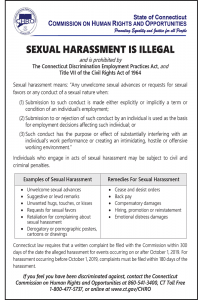 During the 2019 legislative session, Connecticut Governor Lamont signed several acts affecting different labor laws in the state. Two of these acts (19-16 and 19-93) amend the Connecticut Human Rights Law, requiring employers with three or more employees to provide two hours of training and education concerning sexual harassment and remedies available to victims of sexual harassment. To reflect the new amendments, the Commission on Human Rights and Opportunities (CHRO) revised the mandatory Connecticut Sexual Harassment is Illegal posting.
During the 2019 legislative session, Connecticut Governor Lamont signed several acts affecting different labor laws in the state. Two of these acts (19-16 and 19-93) amend the Connecticut Human Rights Law, requiring employers with three or more employees to provide two hours of training and education concerning sexual harassment and remedies available to victims of sexual harassment. To reflect the new amendments, the Commission on Human Rights and Opportunities (CHRO) revised the mandatory Connecticut Sexual Harassment is Illegal posting.
The following are the most significant changes to Connecticut’s Human Rights Law:
- Employers with three or more employees must provide sexual harassment training to all employees by October 1, 2020.
- Employers with fewer than three employees must provide sexual harassment training only to supervisory employees.
- Employers must provide periodic supplemental training not less than every ten years.
- Employees hired on October 1, 2019, or later must receive training within six months of hire.
- Employees have received two hours of sexual harassment training since October 1, 2018, do not need to be trained before October 1, 2020.
- Employees have 300 days to file a complaint with the CHRO.
Under the law (Connecticut General Statutes, Sec. 46a-60(b)(8)), sexual harassment is defined as any unwelcome sexual advances or request for sexual favors or any conduct of a sexual nature when:
- Submission to such conduct is made either explicitly or implicitly a term or condition of an individual’s employment;
- Submission to or rejection of such conduct by an individual is used as the basis for employment decisions affecting such individual; or
- Such conduct has the purpose or effect of substantially interfering with an individual’s work performance or creating an intimidating, hostile or offensive working environment.
Posting Requirements
Connecticut employers with three or more employees are required to post the Connecticut Sexual Harassment is Illegal posting in the workplace to inform employees of their right to be free from sexual harassment and to whom complaints may be reported. Employers are also required to notify employees of the illegality of sexual harassment in the workplace by providing employees with sexual harassment notice via email within three months of hire. The subject line of the e-mail must include the words “Sexual Harassment Policy” or similar phrasing. Employers who do not provide employees with an e-mail account are required to post the information on their website or by providing a link to the CHRO website via e-mail, text message or in writing. This notice can be accessed from our Free Labor Law Compliance Postings webpage. Failure to meet these requirements exposes employers to a $1,000 fine.
What else is new?
During the 2019 legislative session, Governor Lamont also signed Public Act 19-4, increasing the state’s minimum hourly wage from its current $10.10 per hour to $11.00 per hour on October 1, 2019. The minimum wage rate will continue to increase as follows:
- $12.00 per hour effective September 1, 2020
- $13.00 per hour effective August 1, 2021
- $14.00 per hour effective July 1, 2022
- $15.00 per hour effective June 1, 2020.
After October 15, 2023, the minimum wage will be tied to the federal employment cost index. The law also changes the training wage for employees under 18 (except emancipated minors) by allowing employers to pay 85 percent of the minimum wage for the first 90 days of employment, rather than the first 200 hours. Furthermore, the law freezes the employer’s share of the minimum wage requirement for hotel and restaurant staff who customarily receive tips. The current levels will thus remain the same – $6.38 for hotel and restaurant staff, and $8.23 for bartenders.
CPC expects the Connecticut Department of Labor to update the mandatory Administrative Regulations posting with the new amendments to the minimum wage law. We will continue to monitor the state department of labor for the updated posting. Visit our blog soon for more updates on the expected change.
|
|

